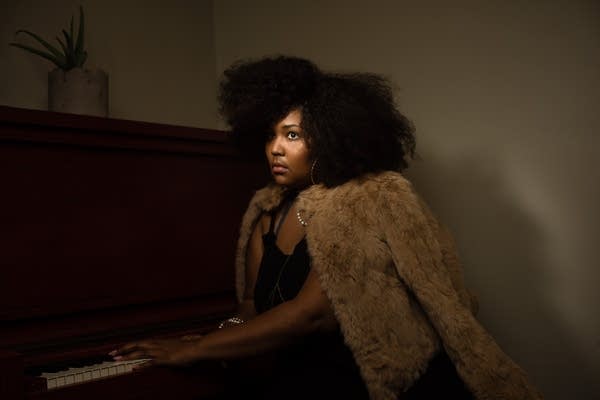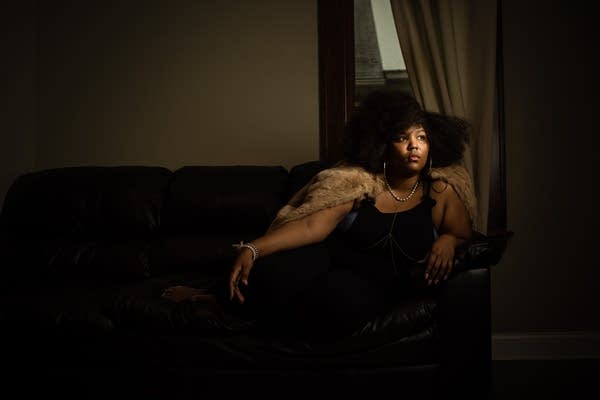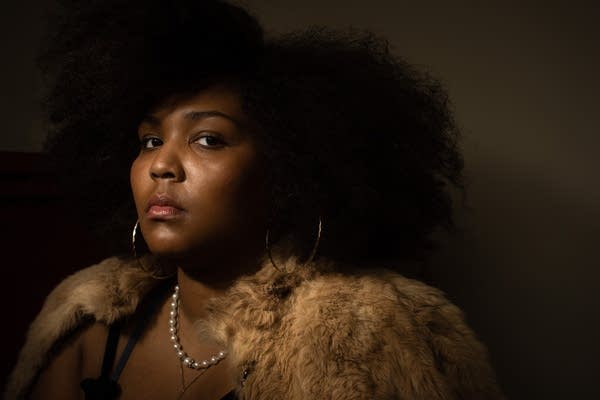The O.K. Show, Episode 9: Lizzo on self-acceptance and falling in love with herself

December 09, 2015
It’s hard to believe it was only about three years ago now that I first heard Lizzo’s voice. I know this is going to sound over the top, but I still remember the exact moment when I heard Lizzo rap for the first time. I was listening to the first single released by her trio the Chalice, and her verse hit me like a bolt of lightning. Who was this woman? She was somehow all of these different things at once: She was smart and funny and antagonizing and fierce, and she switched between different voices and deliveries like a chameleon. I had to hear more.
The Chalice went on to release an EP and win the City Pages best-new-band poll Picked to Click, and Lizzo returned as a solo artist the next year and won the poll again. It was the first time a hip-hop artist had taken first place in the poll, and she did it twice. She is now easily the most popular new hip-hop artist in the scene, capable of selling out First Avenue’s Mainroom with her bestie Caroline Smith or her crew GRRRL PRTY, and thanks to some relentless touring with Sleater-Kinney in the U.S. and on her own overseas in the U.K. and France, she now has an international following.
Lizzo released her solo debut, Lizzobangers, in 2013, and it was picked up for international release by Virgin Records in 2014. Now, she’s releasing new music on her own terms: Big GRRRL Small World is coming out on her very own label.
Much like that early verse from the Chalice that first hooked me, this new album swerves all over the place, from club bangers to soul-baring ballads to a vocoder breakdown about halfway through that’ll have you in tears. And throughout the album, Lizzo dives deep on social issues ranging from body politics, self-acceptance, and empowerment to race relations and feminism. Lizzo has been an active participant in the Black Lives Matter movement and an increasingly vocal champion for women’s rights - her shows with her crew GRRRL PRTY are some of the most empowering I’ve seen this year — but she never preaches at you or puts too fine a point on her ideas. There’s an old feminist adage that says that the personal is political, and Lizzo seems to understand this concept intrinsically.
Throughout the album, Lizzo invites us into her world, and it often feels like we are sitting right beside her as she hops a plane to Paris or checks her voicemail, hoping for a call from a love interest back home. We are in her head as she processes her relationship to her own body and self, and reflects on the reality of being a woman of color in a society that's constantly trying to diminish her value. It’s potent stuff, and a lot to digest in one sitting, but Lizzo makes it go down easy.
I couldn’t wait to talk to Lizzo about the themes on her record, and her own journey toward self-acceptance. She invited me into her home a few weeks before her new album was slated to come out, and we sat at her kitchen table as her brother made coffee for her in the background. I hope you enjoy our conversation.

Andrea Swensson: There's this overwhelming theme on the record of self-love, and I'm really curious to know more about your past experiences with that, and your evolution in that regard. Were you a self-conscious kid?
Um, yeah. I mean, I think we all are to an extent. I was kind of an escapist. I wasn't very present. I have a very vivid imagination. I remember in 8th grade, or 7th grade, there was a period of time where I would just walk through the hallways reading a book. Like Belle from Beauty and the Beast. I would read a book, and I would read these giant fantasy novels, like The Way for Redemption and Lord of the Rings, obviously. And they were in my face, and I would just go from class to class, do what I had to do, and go back to my fantasy world. So for a long period of time, I wasn't present.
And then all of a sudden, you know, when puberty comes, your friends go to different schools and you have a new set of friends, and they talk about boys and shoes and hair, I mean I remember when it hit me — as soon as I was aware of where I was, I became self-conscious. I would criticize myself. I would be like, 'Well, ok, this could be different.' And it wasn't like self hatred. I never took it so far where I was like, 'I hate myself.' But I definitely always kind of — you know how they say, 'If you could wake up and be somebody else?' I would sometimes think about that.
But I think, when you're a teenager and you're growing up and you want to be accepted or cool or pretty, or you want to look like the characters you see on television and movies, I think everyone gets to a point where they grow up and they're like, well that's not going to happen. You know? I'd at least like to hope so. Because I did. I was like, well, you know, this is me. I've done everything I could do to myself. I've been very overweight and tomboyish, and I've been very healthy, went to the gym a lot, got very svelte, and weave and wigs and 'where the boys at,' club goin'. I've been on both sides of the spectrum. And then when I met in the middle, and just decided to let my body do what it wanted to do and focus on what's important to me — which is music and performing and making sure somebody heard the song and had a better day — when I took the focus off of myself for a while, and I looked back at myself, I realized that I liked what I saw.
I have a question about working with BJ Burton [who produced Big GRRRL Small World] — and not just what he added as a producer and the man behind the board, but this is such a personal record, and you're talking about such intimate things. What was it about BJ that made you feel like he could create a safe space to explore these topics?
Lizzo: Oh, BJ's so dope. BJ mixed Lizzobangers, and I met him before I knew that he was going to mix Lizzobangers, and before I knew anything he'd ever done. I just met him because he was in Ryan Olson's house, and there were so many boys there that I was just like, oh, it's another Marijuana Deathsquads dude, you know? But I just remember, we had a connection immediately. I was like, 'We're going to be best friends!'
I like having mind melds with people. Ryan Olson and I have a mind-meld, and Lazerbeak and I have a mind-meld, and a lot of times I feel like I'm melding to them because I respect them; they're older than me, they've been putting out records way longer than I have. So I meld to them and I respect their ideas. But with BJ, we had another type of mind-meld. We're the same age, and we have the same musical upbringing, you know? And all of the mind-melds, I love, because they bring different things out of me. Lazerbeak challenges me. Ryan Olson challenges me. But BJ gets me. Which is rare to find. He's like a quiet, understanding sponge of emotion that I can just squeeze into.

I went to do this interview, that Style Like You interview, "What's Underneath," and that's when I wrote "My Skin." And I was like, ok, this is exactly what I want to say. I found that pinpoint, because of that interview. So it was a long process. I've learned to love a lot of things about myself, and the final thing is my hair and my skin, and learning how to love those things have been such a relief. Because once I'm there, I'm there. And now I can teach someone else how to, or I can show someone else how to. And that's hopefully what this album is going to do, in some way.
Another thing I really am curious about with this record is this role of travel, and different locations. You've lived in different cities, you're shouting out different cities throughout the album;how has getting yourself into different contexts and locations affected your self-knowledge, and realizing who you are as a person?
I know Detroit has a huge, huge influence on when I started singing, and when I started performing, and you hear the soul and the gospel. That's a direct line to Detroit. When I rap, that's Houston. And then all of the music that comes in, and all of the weirdness, the electronic — it starts to get a little weird in there, especially around "Bother Me." "Bother Me? is the perfect mix of Houston and Minneapolis.
I love that song.
That song gets weird. And that's Minneapolis, you know? It helped expand the possibilities of what I was doing. I knew I could flow because of Houston, and I knew that I could eventually learn to sing and I could convey a message, I knew I could catch the spirit because of Detroit, but to be able to know the boundaries and break the boundaries of my musicality — that's all Minneapolis. Because Minneapolis, the people, the artists that live here, they definitely don't follow by the rules. They make new rules and they make new normals. It's inspiring. They don't try to fit into an industry mold, which a lot of these other cities try to do. Because those people want to be accepted, or those people want to be famous, or they want to be big. But Minneapolis - nobody cares about that here. Nobody's trying to be like #1 on Billboard charts. No one's trying to do that; they're just trying to make good music. And they're trying to compel you. And even the people who get notoriety and the people who get national press here, they still almost reject it, you know? Which is cool. I mean, I'm not going to. [laughs] I'm not going to. Because it ain't no fun unless they all get some. But like, I respect that a lot. Because that means that they're true artists, and it means they put the art number one. So all of those cities have taught me that.
I think touring, though, has been interesting. Sophia Eris and I will go to Chicago and find a whole new sound. We'll get drunk and freestyle at a producer's house on Auto-Tune and break through and find a whole different vibe. And I feel like Chicago has been a huge one for us. When I go to Chicago I feel like making music, every time I'm there.
I was really interested in the dichotomy between how you talk about romantic relationships on the record, and your relationship with yourself. You are prioritized. That's what you're working on. And I'm curious if that's something you think about — like, I need to get this in order before I can be a good partner for another person.
Definitely! I don't even think about being a partner for another person, because I'm so partnered with music. I think that because we're human beings and we're in the world, socially I'm going to fall into these traps, or these situations where I get distracted or whatever. But for the most part, it is truly my priority; music has been my priority since I was 12. But then, after the music, there was all this questioning and dark matter. But around 21, I started to put myself first. In my book, you can't have love and the love for music develop at the same time. You just can't have it. I need to develop my music, I need to become a master. And then when myself started creeping up, it got real nice. Because when you love yourself, it's cool. When you have a partner, it's cool. But when you have a partner and you love yourself, it's even better. So I've had my partner for this whole time, I've had music, but I didn't have that self-love realized.
And I don't anticipate romantic love, at all. I don't anticipate it, I'm not expecting it, because I feel really full. If it comes, it's like not even secondary. It's like a third. I have my friends and my family and, honestly, my passion — the actual love of my life, the thing that I felt like I was born to do — to create music. And if somebody comes along, you know, they real lucky. That's all I have to say about that.
I really related to what you were saying earlier. I think every woman has a point where they realize that they're not enough for what society is telling them they're supposed to be. And you just get this voice implanted in your head. And it compounds until you can identify it and confront it.
Confronting it is really scary. I remember when I confronted me. And it was after I gained all my weight back, after living in the gym, and doing crazy stuff like that to myself. When I gained my weight back, I looked and it was like, well, this is it. This is just it. Unless you want to get thousands of dollars in surgery, which a lot of people do and can, unless you do that, this is just who you are, and these are the materials that you have to work with. I remember it was like, O.K. 'This is it' is the strongest statement that I've ever said to myself. Looking in the mirror and just being like, 'Ok, are you cool with that? Ok, cool. Let's keep it moving.' Deal with it. I did. It was very blunt. But it felt good. It felt very final when I said that. Oh, I'm not changing? I'm not going to wake up and be Beyonce one day? Oh, tight. Then I can finally move on with my life.
And start thinking about something else.
Exactly, and now I'm here. And I'm very happy.

Previously:
The O.K. Show, Episode 1: A candid discussion on mental health with Charlie Van Stee
The O.K. Show, Episode 2: Mary Beth Mueller and her one-woman crusade against cancer
The O.K. Show, Episode 3: Adam Levy’s devastating loss and beautiful new solo album
The O.K. Show, Episode 4: Irv Williams, the elder statesman of Twin Cities jazz
The O.K. Show, Episode 5: Lydia Liza on empathy, anxiety, and staying grounded in the music business
The O.K. Show, Episode 6: Hard-touring rapper Astronautalis talks about staying sane on the road
The O.K. Show, Episode 7: Mayda on her health and her journey as a Korean adoptee
The O.K. Show, Episode 8: Manchita on feminism, rapping, and her relationship with Eyedea

